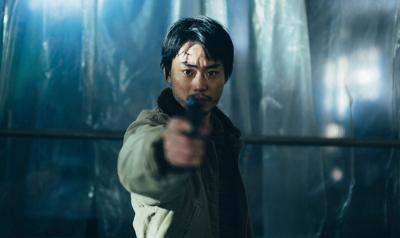No one makes movies quite like Kiyoshi Kurosawa does. His style uses space, time and movement to provide not only genre chills but also to serve as a vessel for his deeper commentary on Japanese society. Shortly after the North American premiere of his film Cloud at last year’s Toronto International Film Festival, the legendary director (no relation to the other legendary Japanese filmmaker named Kurosawa) gave us a glimpse into his creative process — how he conducts movement and what his role as director means to him.
“When I decide the position of actors and the camera, everyone has the same script working with the same story, but they are acting completely different each time,” Kurosawa says through a translator. “The camera can be close or far away, it can be shot from the back or the left or right. The cameraman will say, ‘Let’s focus closer or further away.’ There are so many different situations and variations, these can start to change the story. I think that’s my role as a director — to make a story from these conditions.”
Cloud follows online reseller Ryosuke Yoshii (Masaki Suda), who we can tell immediately is the type of internet salesperson we all know: He scalps limited-supply items, driving up their price. His aggressive buy-low, sell-high style earns him many enemies — he lowballs sellers and price-gouges buyers with cheap items. Kurosawa explains that his inspiration for the character comes from a personal connection — one he was able to translate into a story about how life works in a capitalist society and how the game is rigged in corporations’ favor.
“I have a friend who is a reseller, and he is a very serious person, but he cannot really work in society,” says Kurosawa. “He may not have much talent or money. For those kinds of people, being a reseller could be a good choice to live in the current society in Japan. I asked about his stories and watched him with much curiosity, because he is the kind of person I made to represent Japan. My friend is, of course, not a criminal. However, when I was hearing his stories, I understood that it could go into a dangerous situation. He never had that kind of experience, but it could turn into crime — it could turn into a dangerous situation. He is doing it as an individual person, but from my perspective, the big corporations are doing basically the same thing in reselling stuff to make money, and it could journey into crime. It’s the base of capitalism.”
Kurosawa says his biggest cinematic inspiration for Cloud was Sam Peckinpah’s 1971 film Straw Dogs. That might seem surprising at first due to the thematic differences between the two movies — not to mention Cloud doesn’t feature anything like that famous Straw Dogs scene. But they both feature a slow-burn structure with progressively escalating tension and everyday people turning violent. Kurosawa uses this foundation to subvert the standards of Japanese action.
“I have always really loved American action films since I was young, so I always wanted to make an action film in Japan,” he says. “However, when I was writing the script, I looked around at Japanese action films, and often the main characters are yakuza, policemen or the National Defense Force. Those people are directly related to violence, but I wanted to make a film with people who have nothing to do with violence that turns into a violent story. That’s the kind of action film I wanted to make in Japan, because in my film, normal people end up doing action, so it’s actually not that cool. They aren’t very quick, and sometimes it may look slow or even comedic. That’s the type of action I wanted to make.”
In his years as a director, Kurosawa has been able to reach a global audience with films like 1997’s psychological horror film Cure. He mentions meeting fans from locations as far off as Peru, despite their difficulty in accessing his titles. He reflects on how much his international fans mean to him and the legacy he will leave behind in the world of film.
“I am very happy that people come to see my film, because in Japan, how much money it made is the main topic of the value of the film,” he says. “Maybe my films haven’t made too much profit so far. However, when I look at the world audience, probably tens of thousands more people are watching my film. If I imagine this, it makes me happier than having a hit only in Japan. Also, in the future, people from different countries can come and see it 10 years from now. Maybe even after I die, people will still be watching my film. That’s amazing and is a much better thing than having a hit in Japan.”





